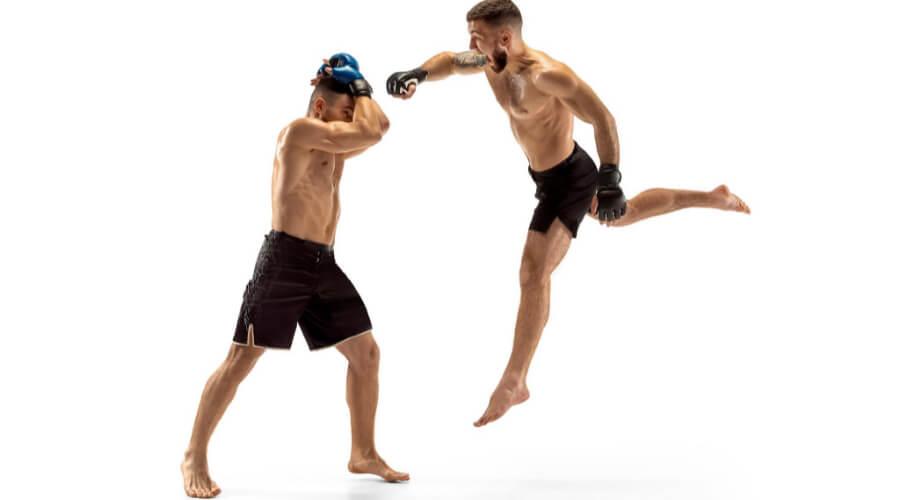Last Updated on October 16, 2023 by Alex PT
Boxing can be a useful form of self-defense, teaching individuals how to punch, block, and defend against common attacks. A 2023 study found that boxing training can significantly improve a person’s ability to defend themselves in a physical altercation.
Advantages and Disadvantages of Boxing For Self-Defense
Advantages of Boxing for Self-Defense:
- Striking Skills: Boxing teaches effective punching techniques, improving your ability to strike and defend yourself in a physical confrontation.
- Fitness and Conditioning: Boxing training enhances overall fitness, including cardiovascular endurance, strength, and agility, which can improve your ability to respond to threats.
- Confidence and Mental Toughness: Boxing builds confidence, mental resilience, and the ability to stay calm under pressure, valuable attributes in self-defense situations.
- Quick Reflexes: Boxers develop quick reflexes and hand-eye coordination, allowing them to react faster to threats and avoid attacks.
- Footwork: Boxing emphasizes footwork and movement, enabling you to maintain distance, circle an aggressor, or escape a dangerous situation.
- Self-Control: Training instills discipline and self-control, helping you assess situations and avoid unnecessary physical altercations.
Disadvantages of Boxing for Self-Defense:
- Limited Techniques: Boxing focuses primarily on punching and head movement, which may not cover all aspects of self-defense, like grappling or ground fighting.
- No Weapon Defense: Boxing training doesn’t address defense against weapons such as knives or guns, which are crucial in some self-defense scenarios.
- Sport-Specific Rules: Boxing rules and techniques are designed for sports competitions, and self-defense situations may involve fewer restrictions.
- Risk of Injury: Boxing carries a risk of injury during training, potentially affecting your readiness for self-defense situations.
- Lack of Verbal De-escalation: Boxing doesn’t emphasize non-violent conflict resolution or verbal de-escalation, important skills in defusing confrontations.
- Legal and Ethical Considerations: Using boxing skills for self-defense can have legal and ethical ramifications. Knowing when and how to employ these skills within the law is essential.
Why Boxing Is Good For Self-Defense
You can learn a wide range of arm techniques in boxing, which can be very effective in a real-life self-defense situation.
Fitness
Fitness boxing offers a complete workout because it involves the movement in your upper body, hips, thighs, and calves. As a boxer, you’ll need to go to training sessions regularly, which in turn, helps with your body fitness. You should be able to withstand a physical attack to some certain level because of the fitness you’ll get when practicing boxing.
Stability
Boxers practice regularly to have a good stance and light mobility which helps in a real-life fighting situation. It keeps them from being knocked down easily by an attacker. Boxers learn how to always stay on their feet to thrive in one-on-one combat.
Blocking Strikes
As a boxer, you won’t be taught how to throw punches and jams alone, you’ll also master how to block strikes and punches from your opponents which will help you wade off attacks. There are a variety of techniques required to learn how to block strikes in boxing. But the most common one is protecting your body and head with your arms. You’ll learn how to block punches like a boxer, more of a reason why you’re taught to keep your arms up during a fight.
Striking Accuracy
Boxing is a perfect sport to learn how to enhance the power, speed, and accuracy of your punch. Learning quite different types of punch techniques is good, but knowing how to execute them properly is better. One good thing about mastering different punching techniques as a boxer is that you’ll be able to recognize the type of strikes your attacker uses. With this, you’ll know the right counterattack to implement at the right time and also how to block any punch from your attacker.
You Can Handle Multiple Opponents

Boxing only teaches you how to handle a one-on-one fighting situation, but that’s not to say that you won’t have a chance of warding off attacks from two or more opponents. If you work on your punching techniques and you can knock out your opponent with a few punches, then you who be able to wade off attack from two or more attackers. But always know when to escape if you’re overpowered because normally the odds are against you.
Boxing Versus Brazilian Jiu-Jitsu in a Streetfight
When comparing boxing and Brazilian Jiu-Jitsu (BJJ) for a street fight, several factors come into play. Each discipline has its strengths and weaknesses in self-defense situations:
Boxing for Street Fights:
- Striking Prowess: Boxing excels in teaching effective striking techniques, making it valuable in close-range stand-up encounters. A boxer can deliver powerful punches, including jabs, crosses, hooks, and uppercuts.
- Quick Reaction: Boxers have sharp reflexes, quick footwork, and excellent head movement, which can help them evade or counter punches effectively.
- Knockout Potential: Boxing’s focus on powerful punches can lead to quicker knockouts when landing solid blows, potentially ending a fight swiftly.
- Street-Ready Fitness: Boxing training enhances cardiovascular conditioning and overall physical fitness, providing an advantage in street altercations.
Limitations of Boxing for Street Fights:
- No Ground Game: Boxing lacks ground-fighting skills, making it ineffective if the fight goes to the ground. In a real-world confrontation, situations often end up on the ground.
- Lack of Defensive Maneuvers: Boxing doesn’t teach techniques for defending against grappling, takedowns, or submissions. This can be a disadvantage if an opponent has a wrestling or BJJ background.
Brazilian Jiu-Jitsu (BJJ) for Street Fights:
- Grappling and Submissions: BJJ excels in ground fighting, focusing on submissions, joint locks, and chokes. If taken to the ground, a BJJ practitioner can control and submit an opponent effectively.
- Escaping and Neutralizing Threats: BJJ provides techniques for controlling an aggressor on the ground, allowing the practitioner to avoid damage and minimize harm until help arrives or they can safely disengage.
- Less Risk of Legal Ramifications: BJJ allows for more control and restraint, reducing the risk of seriously injuring an opponent. This can be crucial in legal situations after a street fight.
Limitations of BJJ for Street Fights:
- Lack of Striking Skills: BJJ primarily focuses on ground combat, which means it doesn’t provide training in striking or defending against strikes.
- Multiple Attackers: In a street fight involving multiple assailants, going to the ground can be risky since it leaves you vulnerable to attacks from others.
- Injury Risk: While BJJ techniques are effective for control and submission, they may not protect you from strikes or other threats while on the ground.
FAQs
We’ve composed a list of the frequently asked questions and answers about boxing as a combat sort for self-defense.
Is Boxing Hard To Pick Up?
Boxing techniques and skills are quite difficult to master even though it is not a difficult sport to learn. People from the outside think that boxing is all about keeping your arms up and striking your opponent when you get the chance. Honestly, it’s more than that! It is a combat sport that requires your physicality, flexing the muscles in your upper body, and strengthening your cardiovascular system.
Should I Learn Boxing Or Kickboxing?
Both kickboxing and boxing are two excellent combat sports for self-defense, but boxing only involves using arm techniques while kickboxing involves using knees, takedowns, and kicks. If you want to master great striking techniques with your fist alone, then boxing is a suitable option for you. However, if you’re looking to learn a combat sport that involves another part of your body, then kickboxing is an ideal choice. Kickboxing is preferable because it teaches you how to strike an opponent with different parts of the body.
How Long Does It Take To Master Boxing Techniques For Self-defense?
Beginners with an average fitness level will take up to 40 months to master all the techniques required in the game if they train and spar consistently 2-3 times a week. Within this short time, you’ll learn all the basics of self-defense and how to knock down your opponent in a short time.
Is Boxing Better Than MMA For Self-defense?
Boxing and MMA are great skill sets to master when it comes to self-defense and various real-life situations. However, you should know that a boxer won’t really be effective when he’s pinned to the ground by his opponent. That’s why we recommend MMA because it is more adaptable to a wide range of techniques and skills.
Which Is The Hardest Martial Art To Learn?
According to reports, Brazilian Jiu-Jitsu is still the most difficult combat sport to learn. Mastering the required techniques and skills of Brazilian Jiu-Jitsu isn’t quite easy. But if you’re consistent and dedicated, you’ll eventually learn how the techniques of Jiu-Jitsu. By the way, Brazilian Jiu-Jitsu still remains the best combat sport for self-defense.
Which Fighting Style Is More Deadly For Street Fights?
Krav Maga is the most deadly discipline for street fights as it has some of effective techniques to neutralize, kill, or cause severe injuries to your attackers.
Final Words
Boxing doesn’t prepare you for certain fighting situations though it can teach you some good techniques for self-defense. As a boxer, you won’t master the techniques required to subdue your opponent on the ground. You may be stuck to the ground if your attacker is able to pin you down even if you know how to get back up. Nonetheless, good self-defense should combine a variety of martial arts like Brazilian Jiu-Jitsu which is known for its benefits in ground grappling and self-defense. You’ll get a better chance of winning a fight wherever it takes you if you can master the techniques required to submit your opponents on the ground. More of a reason why MMA fighters learn multiple styles of fighting.
References:
https://evolve-mma.com/blog/is-boxing-good-for-self-defense/
https://baysideboxing.com.au/is-boxing-good-for-self-defense-pros-and-cons-of-boxing/

Hi! I’m Alex PT. I hold a Bachelor’s degree in Sports Management from Indiana University and have over seven years of valuable experience working in a Sports Event Management Company. I founded SportBlurb with the passion for bringing you the latest, most insightful, and engaging content in the world of sports. So, whether you’re a die-hard fan or want to stay informed, I’ve got you covered!

